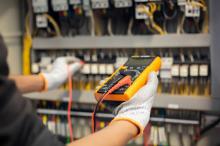Understanding Commercial Electrical Demands Commercial spaces require more robust electrical systems than homes. Businesses often run heavy machinery, high-output lighting, HVAC systems, and computer networks all at once. These demands need large-capacity wiring, multiple circuit panels, and advanced distribution systems.
Unlike a residential electrician who typically works with 120-volt systems and relatively simple configurations, a commercial electrician handles three-phase systems and much higher voltages. This specialization allows them to ensure that businesses operate without interruptions or hazards.
Installation of Specialized Equipment
In a commercial environment, electrical systems must support more than just lighting and appliances. They must also integrate security systems, surveillance, fire alarms, access control systems, and data centers. Each of these requires a different approach to installation, wiring, and ongoing support.
A residential electrician is unlikely to have the expertise or equipment necessary to manage such a broad range of technology. Hiring a commercial electrician ensures that all systems are not only installed correctly but also interconnected properly for seamless operation.
Safety and Regulatory Compliance
Safety codes for commercial buildings are much more stringent than those for residential properties. A commercial electrician is well-versed in national and local regulations governing high-occupancy buildings, public safety systems, and energy efficiency standards.
While a residential electrician also follows codes, the complexity in commercial buildings—like emergency lighting, evacuation systems, and transformer placement—requires advanced planning and in-depth knowledge of legal requirements.
Maintenance and Emergency Services
Businesses can’t afford extended downtime. Electrical problems can halt operations, affect customer service, or even damage reputation. A commercial electrician offers regular maintenance services to prevent these issues, as well as rapid response during emergencies.
Residential electricians offer repairs too, but they’re usually not equipped for the scale and urgency of a commercial electrical failure. Businesses benefit from the prompt, knowledgeable response of a commercial electrician who understands system layouts and can fix issues without major delays.
Working with Blueprints and Project Teams
Construction and renovation projects in commercial buildings require detailed coordination. A commercial electrician reads complex blueprints and works with engineers, architects, and construction managers to ensure every phase of electrical installation aligns with broader project goals.
While a residential electrician also reads plans, they usually deal with simpler layouts and smaller crews. Commercial electricians, by contrast, are experienced in large-scale collaboration where precision timing and workflow integration are essential.
Smart Technologies and Automation
From smart lighting systems that adjust based on occupancy to advanced building automation that controls everything from climate to security, modern commercial spaces are rapidly adopting technology.
A commercial electrician brings the expertise to install and configure these systems correctly, ensuring they are efficient and user-friendly. Though a residential electrician can handle smart home systems, the complexity and capacity of commercial automation are on a different level altogether.
Long-Term Efficiency and Savings
Commercial buildings consume large amounts of energy. A skilled commercial electrician can evaluate a building’s electrical load and suggest upgrades that save money over time—such as energy-efficient transformers, LED systems, or improved power distribution layouts.
While a residential electrician may recommend home-based energy solutions, the larger scale of commercial work requires deeper energy audits and long-term efficiency planning, something commercial electricians are trained to provide.
Conclusion
Whether it’s powering a hospital, maintaining a shopping center, or wiring a new office complex, a commercial electrician plays a vital role in modern infrastructure. They offer expertise that goes far beyond basic installations, handling complex systems with high stakes for safety, efficiency, and compliance. While residential electricians are essential for the homes we live in, only a commercial electrician can truly meet the demands of today's high-powered, fast-paced commercial environments.
